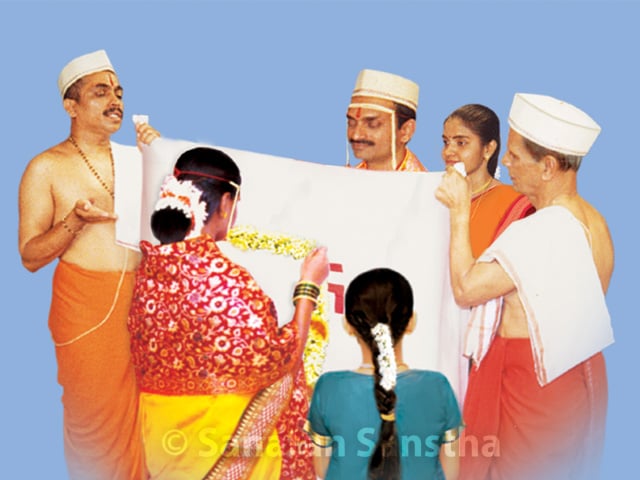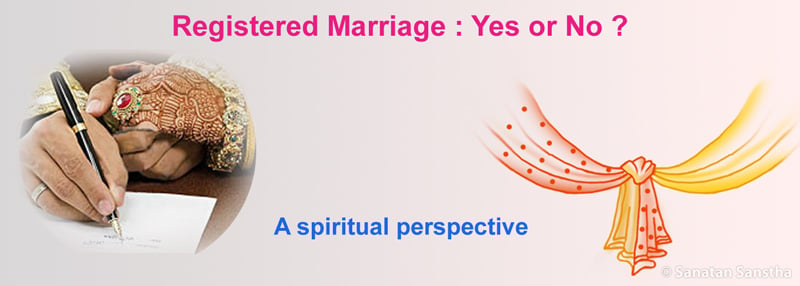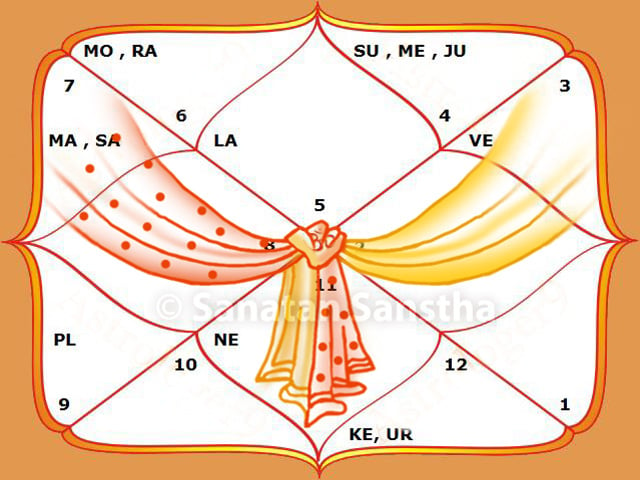Hindu Dharma has advised sanskars to be performed during the sixteen principal events of life, so as to move closer to God. The most important of them being the ‘Vivah sanskar (Hindu wedding sanskar)’! The true objective of a wedding is that two individuals seek the blessings of God to lead a compatible and happy married life! For this, it is absolutely essential to perform the ritual of marriage strictly as per the scriptures. This article explains the importance of performing Vivah sanskar (Hindu wedding sanskar) amidst rituals.

1. Meaning of vivah (Hindu wedding)
Taking the bride from her father’s home to one’s own home is termed as ‘vivah’ or ‘udvah’. Vivah means
-
Panigrahan, meaning the groom holding the hand of the bride to accept her as his wife. Since the man holds the hand of the woman, she should go to him after Hindu wedding. A man going and staying with the woman is inappropriate.
-
Upayam : Going close to the bride or accepting her.
-
Parinay : Holding the bride’s hand and circumambulating the fire.
2. Importance of Vivah sanskar (Hindu wedding sanskar)
A. Hindu Dharma has prescribed four Purusharthas, that is Dharma (Righteousness), artha (Material gain), kama (Desire) and Moksha (Final Liberation). The purpose of the vivah sanskar (Hindu wedding) is to fulfill the Purushartha of ‘kama’ and then gradually advance towards ‘Moksha’.
B. Several important things in the life of a man and woman are associated with marriage; for example, love between man and woman, their relationship, progeny, various happy events in their lives, social status and prosperity.
C. Society respects a married woman, which assists in keeping the society in a healthy state : ‘Sight of a woman with kumkum (Saffron) on her forehead, wearing a mangalsutra around her neck, green bangles, toe rings and six or nine-yard saṛi automatically generates respect for her in the mind of an observer. Due to the relationships of wife, daughter-in-law, paternal aunt, sister-in-law etc. after marriage, a woman automatically gets a respectable position. Viewing a woman (other than the wife) as a mother and with respect keeps the society in a healthy state. Spinsters can look up to such a woman as their ideal.
3. A Hindu wedding performed amidst religious rituals is superior to a registered marriage

A. Importance of performing Hindu wedding as per the religious rituals and its benefits
-
A Hindu wedding enhances the sattvikta (Purity) in the gross and subtle bodies of both, the bride and the groom, and more than fulfilment of desires, it helps in merging with each other at the psychological level and if the spiritual level is beyond 70% then merging at the spiritual level : When Hindu wedding is performed according to scriptures, it has a number of rituals. Every ritual contributes towards enhancing the sattvikta in the gross (physical) and subtle bodies (mind, intellect and ego) of the bride and the groom. That is why, more than fulfilment of desires, it helps in their merging at the psychological level and if the spiritual level exceeds 70%, then merging at the spiritual level. Hindu Dharma has made a Raja-Tama (Bound by activity and ignorance) event like marriage sattvik (Sattva-predominant), by combining it with Spirituality; thus, providing an opportunity to obtain the grace and blessings of Deities.
-
After performing a Hindu wedding as mentioned in the scriptures results in increase in sattvikta of the bride : Religious rituals performed while performing a Hindu wedding as per the scriptures and recitation of mantras enhance the sattvikta of the body of the bride and the groom. Distressing Raja-Tama vibrations in their bodies decrease, making their bodies radiant.
B. Benefits
-
A husband accepts a ‘dharma-patni’ : Since Dharma permits accepting of a patni (Wife), after getting married as mentioned in the scriptures, the wife is referred to as ‘dharmapatni’.
-
Greater awareness about responsibilities than rights : As a (Hindu wedding) takes place by performing sattvik sanskar, the husband and wife become introverted. Hence, they look upon each other not only at the physical level, but also at the psychological level. They are concerned about each other and behave with understanding and love towards each other. In fact, they are more aware about their responsibilities than their rights.
-
A sattvik offspring is born: When a wedding is performed with a sattvik sanskar, the offspring is sattvik from birth itself.
-
Family health is maintained and the children are inspired to lead a life abiding by Dharma: An ideal lifestyle of the parents and celebration of various religious festivals and observance of vrats (Vowed religious observances) and family traditions, helps maintain the health of the family. The children too derive inspiration to lead a life abiding by Dharma.
4. Matching of horoscopes while arranging a Hindu wedding

Before arranging a Hindu wedding, it is appropriate to match the horoscopes of the prospective bride and the groom. Hence, it is essential that the horoscopes of both are accurate. The individual who makes the horoscope should be proficient in his task too.
A. Limitations
Even if all thirty-six points in the horoscope match (100%), the matching between husband and wife or between average individuals is only about 10% and not 100%. Besides, in the present Yug (Era) one should keep in mind that only 35% astrological predictions as per horoscope are accurate.
B. Matching attributes of the bride and the groom
as per horoscope and their compatibility as husband and wife
| Matching of attributes | Maximum compatibility of the husband and wife % | Matching of attributes | Maximum compatibility of the husband and wife % |
|---|---|---|---|
| 18 | 10 | 30 | 30 |
| 20 | 15 | 32 | 35 |
| 25 | 25 | 36 | 40 |
Reference : Sanatan Sanstha’s Holy text ‘Marriage sanskar’

